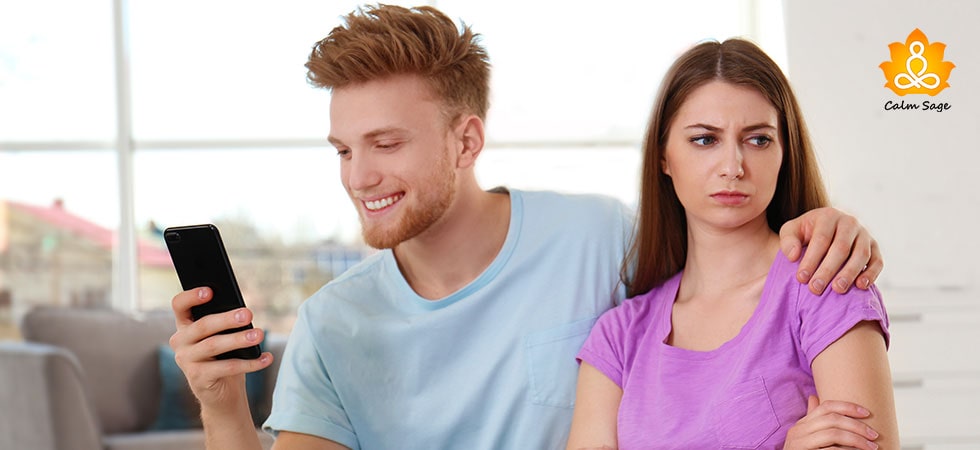Is Phubbing Hurting Your Relationship?

In today’s world connected with smartphones, a new challenge has emerged that poses a threat to our relationships: phubbing. This term, created by combining “phone” and “snubbing,” describes a behavior that has unfortunately become widespread. In this guide, we will explore the concept of phubbing, its origins, its impact on relationships, and effective strategies to combat this trend.
What does Phubbing Mean?
Phubbing refers to disregarding one’s companion in favor of a device. It is a highly impactful distraction that can negatively affect the quality of our interactions. While smartphones have revolutionized communication, they have also introduced hurdles. The constant allure of notifications, social media updates, and the constant need for information have profoundly reshaped our behavior.
Why do we engage in Phubbing?
“Phubbing” is an amalgamation of the words “phone” and “snubbing.” It encompasses ignoring someone in a setting by giving attention to one’s phone instead. In this age, such behavior has become increasingly prevalent due to the following reasons:
1. Digital Distraction:
Smartphones are always available. The allure of media, messages, and notifications can make people prioritize their devices over face-to-face interactions.
2. Fear of Missing Out (FOMO):
Some individuals feel compelled to stay connected so they don’t miss out on updates or events.
3. Social Anxiety:
People may use their phones to avoid socially anxious situations where they would have to talk in person.
4. Escape from Reality:
Smartphones provide an escape from the world, allowing people to temporarily disconnect by immersing themselves in virtual worlds, games, or entertainment.
5. Technology Addiction:
Excessive smartphone use and dependence on devices can lead to behavior making it hard for individuals to resist the urge to check their phones constantly.
6. Social Acceptance:
In circles, ignoring others by focusing on your phone (phubbing) may be seen as normal or even acceptable behavior, making it seem less rude or disruptive than it is.
7. Multitasking Mentality:
Some people believe they can effectively multitask by using their phones while participating in conversations or social events.
8. Lack of Awareness:
Sometimes, people are unaware of their phubbing behavior’s impact on those around them, assuming that it goes unnoticed or isn’t bothersome.
How Phubbing Damages Connections?
Phubbing, which involves ignoring someone in favor of a device, negatively affects relationships. This harmless behavior can have far-reaching consequences, undermining the foundation of healthy and fulfilling connections. Let’s take an in-depth look at how phubbing harms relationships:
1. Diminished Presence:
When one partner consistently prioritizes their phone, it diminishes the quality of time spent together. Genuine presence, which is essential for interaction, is compromised.
2. Breakdown in Communication:
Meaningful conversations are interrupted, cut short, or completely ignored. This leads to a breakdown in communication. Hampers the sharing of thoughts, feelings, and experiences.
3. Emotional Neglect:
Phubbing sends a message of neglect. It conveys that the person using their phone takes precedence over the partner, resulting in feelings of insignificance and unimportance.
4. Undermining Intimacy:
Both emotional and physical intimacy suffer due to phubbing. Prioritizing a screen over a partner creates distance and disconnects, eroding the closeness that forms the core of relationships.
The constant act of ignoring someone, for your phone can make partners question each other’s dedication and investment in the relationship. It creates a feeling that the partner using their phone values the world more than their real-world connection with their other.
Over time, consistently ignoring someone for your phone can plant seeds of uncertainty and insecurity. Partners may start to doubt their worth, wondering why they aren’t captivating enough to hold their other’s attention.
Phubbing often leads to an imbalance in relationship dynamics, where one partner consistently feels undervalued or ignored. This inequality can breed feelings of resentment and dissatisfaction.
Engaging in shared activities and experiences is crucial for building a relationship. However, phubbing prevents partners from having these bonding opportunities, hindering the growth and development of the relationship.
Consistently being ignored by a screen can increase stress levels for the partner. It creates an environment of uncertainty and emotional turmoil, which can negatively impact well-being.
Repeatedly being overlooked in favor of a screen can lower self-esteem and self-worth. Partners may start believing they are less important or valued than the world.
Escaping the Clutches of Phubbing: Tips for Change
Freeing yourself from the grip of phubbing, which is the use of your phone in social settings, is a positive step towards more meaningful and engaging interactions. Here are some strategies that can assist you in overcoming phubbing:
1. Create timeframes and situations where you commit to putting your phone, such as during meals, family gatherings, or face-to-face conversations.
2. Be fully present in the moment. Actively engage with those around you. Being mindful helps you become more aware of your habits and choose when to use your phone.
3. Establish No “Phone Zones ” in particular areas within your home or workplace where using phones is prohibited. This creates spaces dedicated to in-person interactions without distractions.
4. Decrease the frequency of alerts or notifications on your phone. By doing so, you’ll be less inclined to check for updates.
5. Set aside time slots for activities with loved ones, such as game nights, outdoor adventures or simply sitting down for a heartfelt conversation.
6. When conversing, give attention to the speaker. Actively listen to what they have to say.
7. Avoid the temptation of checking your phone or mentally planning your response while someone is talking to you.
8. Take advantage of your phone’s “Do Not Disturb” Mode feature. It allows you to focus on the moment without being interrupted by notifications.
9. Find hobbies that don’t involve screens, such as reading books, going for walks, or pursuing creative activities.
10. Let your friends and family know about your commitment to being more engaged in interactions. They can support you. May even adopt habits themselves.
11. Take a moment to reflect on how phubbing might impact your relationships. Recognizing the harm it can cause might motivate you to change your behavior.
12. Start with achievable goals for reducing phone usage in situations. As you become more comfortable, gradually increase these targets.
13. Remember that breaking any habit takes time and effort. Be patient with yourself. Acknowledge the progress you make, no matter how gradual it may be.
Nurturing and prioritizing relationships
While phubbing is a problem, it is not insurmountable. By understanding its origins and effects as implementing proactive strategies, we can regain and foster vital and meaningful connections for thriving relationships. Don’t forget the ability to nurture relationships is within our control, not our smartphones. Let’s prioritize being present in phone-distracted behavior and build connections that withstand the trials of time.




















